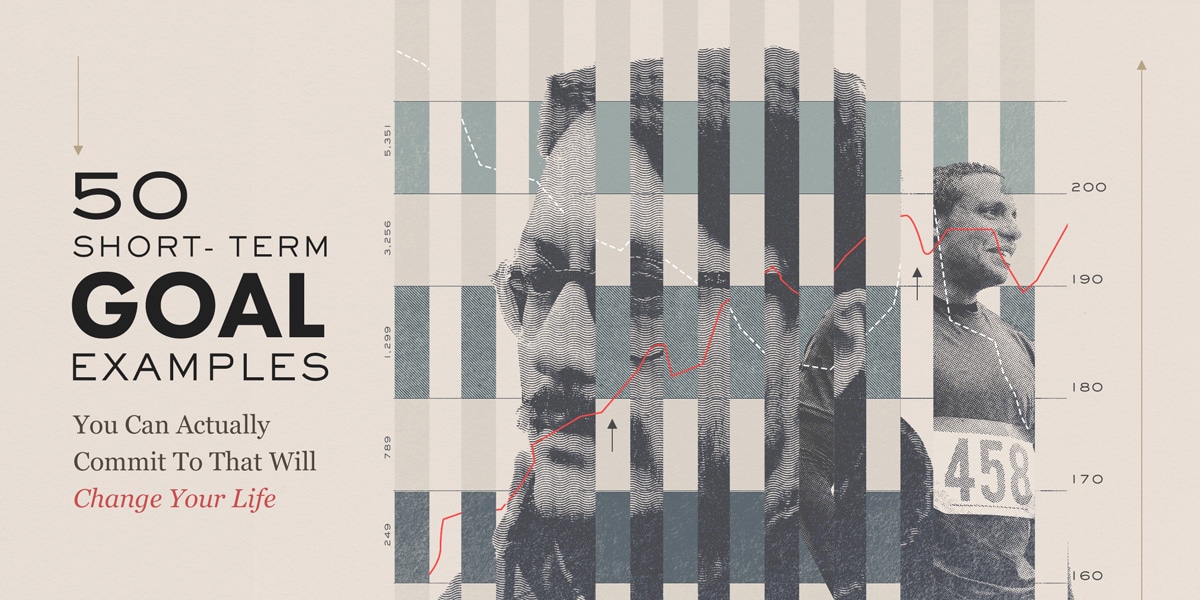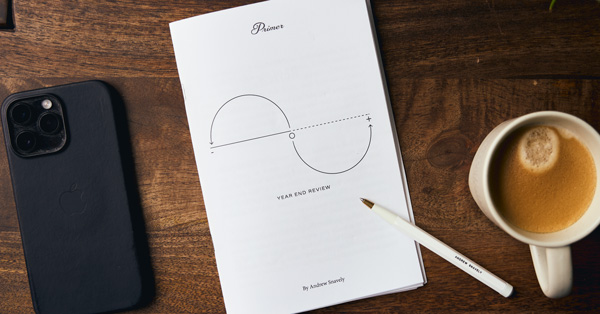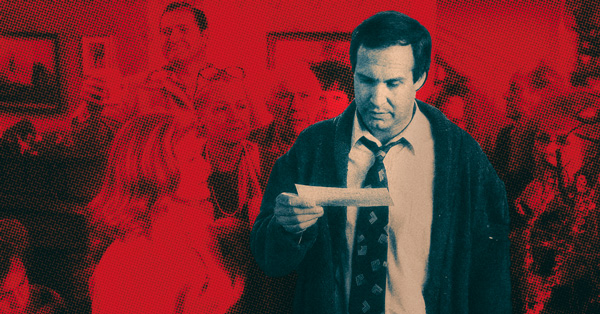Have you ever set a personal goal for yourself like “I want to lose weight,” or “I want to get a better job,” and then woke up 6 months later still in the exact same situation you were in?
Man, you must just be terrible at accomplishing things.
Or maybe it was something far simpler: Your goals were terrible. Why?
Because things like “lose weight” and “get a better job” aren’t good goals, they’re outcomes.
They’re desirable … but as goals, they’re useless. In fact, vague, overly-broad goals like that will actually prevent you from getting what you want in life and will just make you feel defeated.
I Used To Be Bad At Personal Goals … Here’s How I Got Better
For years I struggled with meeting my goals. I’ve always made lots of goals, like “Eating healthier,” “Getting in shape,” and “Doing more things with friends.” After I made a big, important life goal I always felt good – life transformation, here I come!
The problem was, I never achieved the goals I set.
Obviously, my goal-making process was broken and it was getting in the way of achieving the things I wanted in life. Instead of using goals to move toward a larger aspiration, they had become impediments. My goals were using me.
The Difference Between Goals and Aspirations
Think about the last few small goals you made. Were they something like…
- “Control my spending”
- “Write a screenplay”
- “Read more books”
- “Call my mom like ever”
- “Improve my communication skills”
Those aren’t goals. Those are aspirations masquerading as goals. When you say something like “control my spending” what you really mean is “Be financially secure.” Financial security is an excellent thing to want – and it’s a great aspiration.
But it’s not a goal.
Aspirations are desired outcomes not bound to specifics. How would you know if you've achieved your aspiration of “being financially secure”? Anything that isn't clear cut relies on a feeling. It's totally fine to aspire to feel certain things as the result of an outcome, but they make terrible goals.
Aspirations are dreams. Goals, as you’re about to discover, are systems – to be actionable, achievable, and USEFUL, and any goal you make must be short term.
Witness: The Gospel Of Short-Term Goals
Here’s the secret to, well, everything: you need to start setting short-term goals. Maybe just one. Maybe a whole bunch that build on each other towards something larger.
Are you currently in a state where you feel like you're just going through the motions, lacking the drive and enthusiasm to make meaningful progress in your life? You might be experiencing what psychologists call “languishing.”

It's that feeling of being stuck, where your goals and aspirations seem distant and unattainable. But don't worry; you're not alone in this. This is a common experience that I know all too well. The good news is that there's a way out of this sense of stagnation, and it begins with setting short-term goals.
Whatever the case, your personal goals need to stop being big, ambitious, ill-defined desired outcomes and start being simple, measurable, attainable, relevant, and timely (more on that later).
If you’re already overwhelmed, don’t be. I’m going to walk you through the whole process.
In fact, let’s make a goal right now: by the end of this post, you want to have a full-proof method for creating small, short-term goals that you know you can achieve.
Ready? Let’s dive in.
What is a Short-term Goal?
Short-term goals bridge the divide from where you are to where you want to be in a way you can actually achieve.
Short term goals are “short” for a reason. They are things to be accomplished within a quick time frame, not more than a month or two. They may be explicitly part of a larger mid-term or long-term goal, but not necessarily.
Sometimes it’s the short-term actions that help you discover what you want your long-term goals to be. Nifty, huh?
Why Short-term Goals are Essential to Improving Your Life
Living life without goals is like banking your retirement on winning the lottery.
Without goals you’re just oozing through daily life hoping for improvement … without actually working toward it. Hope is important but it’s not a strategy. Hope is a feeling – not a plan.
Goals are how you operationalize your aspirations, desires, and dreams. Short-term goals are how you make day-to-day progress on the big, life-enhancing changes you want.
So, in summary: You need goals, and you need them to be good goals.
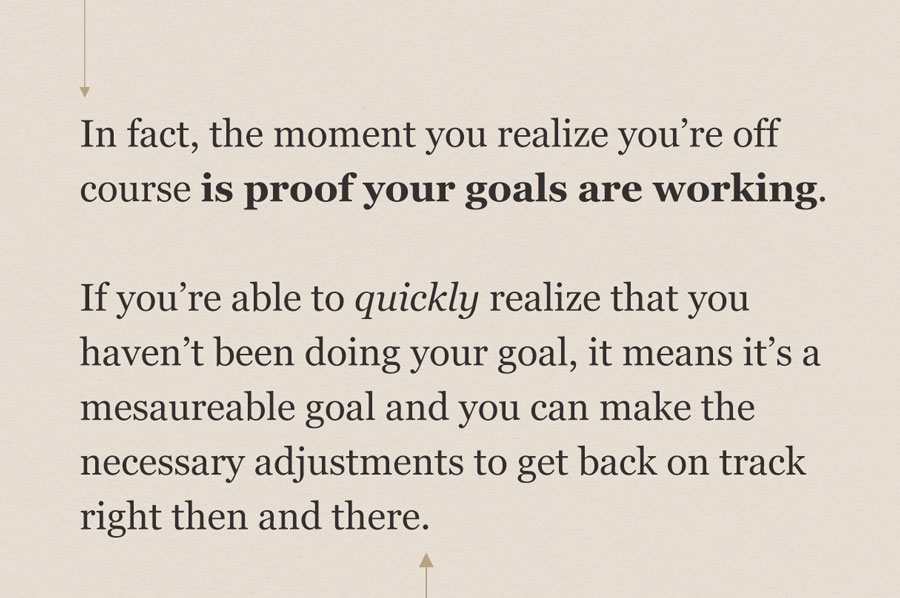
What Makes A Good Goal?
I used to frustratingly believe goals were kind of like genius – you either have this magical ability to make and achieve great goals or you don’t. People who are good at accomplishing personal goals are born that way.
Thankfully, I was wrong.
In fact, psychologists have studied good goal-making. A lot. To immediately start making better goals, try the S.M.A.R.T. goal technique.
SMART goals will be:
Simple.
Distill it into a few words and make it straightforward. More than that will begin to feel overwhelming, or worse, loose and scattered.
Measurable.
Your goal should be easily quantifiable. Find a way to tell whether you’re doing it or not and track that.
Attainable.
Deciding to run every day when you haven’t run since high school is a high bar to set. Be reasonable with yourself: It’s great to be ambitious in the long term, but short-term goals should be achievable steps toward growth.
Relevant.
Why is this goal important? Does it enhance or conflict with larger goals? Does it align with your current physical, mental, or financial reality?
Time-bound.
Goals should have a time frame assigned to them so you can adjust or improve as you go.
Losing weight is not a goal. How will you know if you are on track or not? Eating healthier is not a goal. How will you know at any given moment if you are doing it?
Here’s the key:
Do not aspire to be someone who benches 200 lbs. Aspire to be the person who lives a lifestyle that allows them to bench 200 lbs.
- They work out 3 times per week.
- They increase weight progressively based on a specific plan.
- They consume a specific amount of protein each day to allow their body to grow into something that can press 200 lbs.
Each of those can easily be turned into a S.M.A.R.T. goal for you to reach the outcome of being a person who can bench 200 lbs.
If you feel like you've tried setting goals in the past but never got anything productive from the exercise, a similar acronym to S.M.A.R.T. may help illustrate a new approach: A.B.C.:
A: Achievable, B: Believable, and Committed.
Often when we're motivated to come up with goals, they may be far too ambitious based on where we are, our current state of productivity and emotional tools we have access to, or what we genuinely can commit to.
Using A.B.C. to validate our S.M.A.R.T. goals may help us recognize that what we've come up with is not believably achievable, either in the timeframe we've allotted or the real-world, day-to-day requirements making that commitment would require.
If you want to better guarantee improvement and movement on your goals, make them doable but a challenge just out of your comfort zone. Continue to increase the difficulty in each subsequent set of goals. Don't rely on motivation alone, set your goals up as a system.
Short-term Goal Setting Template
50 Short-term Goal Examples
Let’s take a look at some examples of short-term goals to get your gears turning.
Bad goal: Start running. (Too vague, no achievable outcome, no deadline).
Good goal: Jog for 20 minutes twice per week for six weeks. (Specific, personal, realistic, time-based).
Short-Term Personal Goals Examples
- Do a nightly gratitude journal for 1 week; or journal for 15 minutes every morning for 2 weeks
- Limit social media screen time to 30 minutes per day, or get off screens by 9:00 p.m. everyday for 2 weeks
- Do one lesson on Justin Guitar per week or finish one Coursera course within a month
- Spend 90 minutes per week on a new hobby for one month
- Try one new home cooked meal per week until the end of the year
- Give 2% of your monthly income to charity each pay period for two months
- Read for 10 hours each month
- Water your houseplants every 12 days (not too much!)
- Teach yourself one new home repair skill every month
- Use a distraction-limiting focus mode on your phone for 1 week
Short-Term Health & Fitness Goals Examples
- Go to the gym Tuesday, Thursday, and Saturday with no required minimum workout
- Only consume 1 alcoholic drink per session for 2 weeks
- Meditate for 10 minutes before bed 4 times per week
- Wake up 15 minutes earlier to make a real breakfast every workday for 2 weeks
- Cut off caffeine at noon every workday for one month
- Eat vegetarian on Mondays and Thursdays for 6 weeks
- Set a timer to get up and stretch for 2 minutes every hour
- Bike to work one day per week for a month
- Do a Sunday morning hike every week for a month
- Drink only water every Wednesday for 1 month
Short-Term Career Goals Examples
- Complete one continued education online course or training program per month
- Research and commit to attending an industry conference within 90 days
- Invite one coworker or boss to coffee outside of the workplace per week for 6 weeks
- Schedule one informational interview with a grad school counselor by the 1st of next month
- I will spend 45 minutes updating my resume every Sunday for 4 weeks
- Get to work 1 minute early every day for a week. Then make it 2 minutes, then 3 – all the way up to the optimal time you want to be at your desk
- Reach out to one friend, family member, or acquaintance you admire tomorrow and set a date to discuss how they achieved success
- Read 1 amazing book on leadership each month for the next 5 months
- Seek out and attend a public speaking or leadership meetup in your town by next week
- Visit TED.com and watch one talk by an industry leader per day on your lunch break instead of watching Youtube
Short-Term Goals Examples for Your Relationships
- Call your high school best friend once per month
- Plan a true date night for your partner on the first and third Saturdays of the month
- Join a kickball team for a season
- Host a game night with friends within the next 20 days
- Simply start an interaction with someone you find attractive with zero expectations once per week
- Make a meal for someone in the next week
- Research 3 options for a couples therapist by the end of the week and have an appointment by the end of the month
- Join a spiritual community of some kind for 1 month
- Commit to being a better listener for 1 week
- Ask someone out on a date, in person, in the next week
Short-Term Financial Goals
- Drink only homemade coffee for 10 days, or bring your lunch to work 3 times per week
- Any recreational purchase must be added to a Should I Buy This jar/folder/account that can only be acted on after it’s been on the list for 7 days
- Move 5% of your paycheck to a savings account per pay period and assess if you noticed it missing from your wallet at the end of the month
- Sign up for a budgeting app like Simplifi or YNAB, and use it everyday for two weeks. At the end of that time, see if you noticed any changes in your spending habits.
- Open a high-yield interest account by the end of Sunday
- Save on groceries and make a double portion of one of these recipes every week
- Open some type of retirement account like an IRA in the next 14 days
- Create a monthly budget of expenses and attempt to reduce it by 10% within the next 10 days
- Schedule an appointment with a financial counselor within two weeks
- Make a date with yourself and a bottle of wine to honestly look at any credit card debt that’s been lingering for more than six months. Just this could be a huge win for many
How To Track Your Goals
A great goal must be Measurable, so you must track it in some way. There are a few different ways to do this.
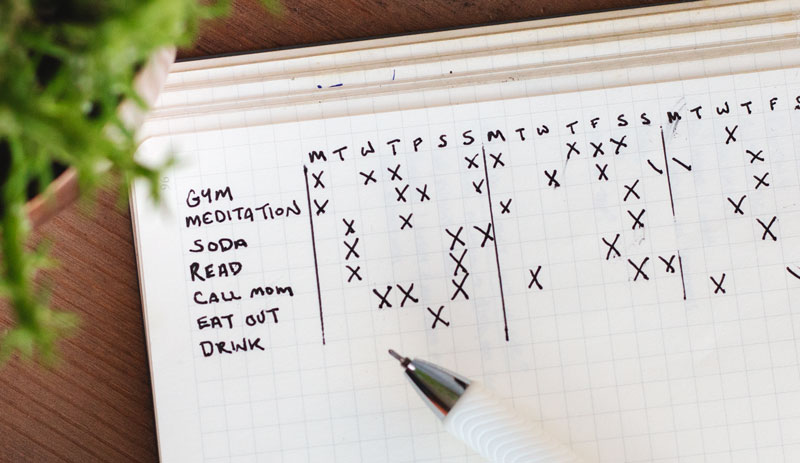
Bullet Journal
A longtime favorite method for tracking goals is in my journal. I’ve done this for about four years. At the end of each day, I’ll do an audit checking off the boxes for the things I did that day. They can be things that are positive goals like working out or meditating, or they can be things I’m trying to do less of, like checking off a box if I ate out.
At the end of the week, I review how I did – and here’s the critical part:
I assess the need to make changes or alterations based on my performance. If I’m trying to drink a gallon of water a day but am averaging 16 ounces, I need to come up with some serious adjustments to my routine.
Or – I need to adjust my goal.
Recognizing that a goal was too ambitious or not attainable in the time frame you’ve allotted is not failure. It simply means that after testing, it’s become clear the expectations need to be revised to be more relevant.
And in 6 months, I’ll be in a far better place with daily water intake if I recognize it fast and reduce my goal to 32 ounces a day to start than if I force myself into thinking I can just power through such a wide discrepancy.
Remember: Great goals are about creating the lifestyle that allows your desired outcome to exist. – Click to tweet
Goal Setting & Milestone Tracking Apps
An alternative to using pen and paper is using one of the great goal-tracking apps out there. What’s most important is finding one that is easy to use and convenient.
One of the more popular apps is Fabulous, developed in Duke's Behavioral Economics Lab, which boasts 18,000 reviews with a 4.6 star average. A fun one to consider is Habitica, which turns your goals into a retro-slick 8-bit style game.
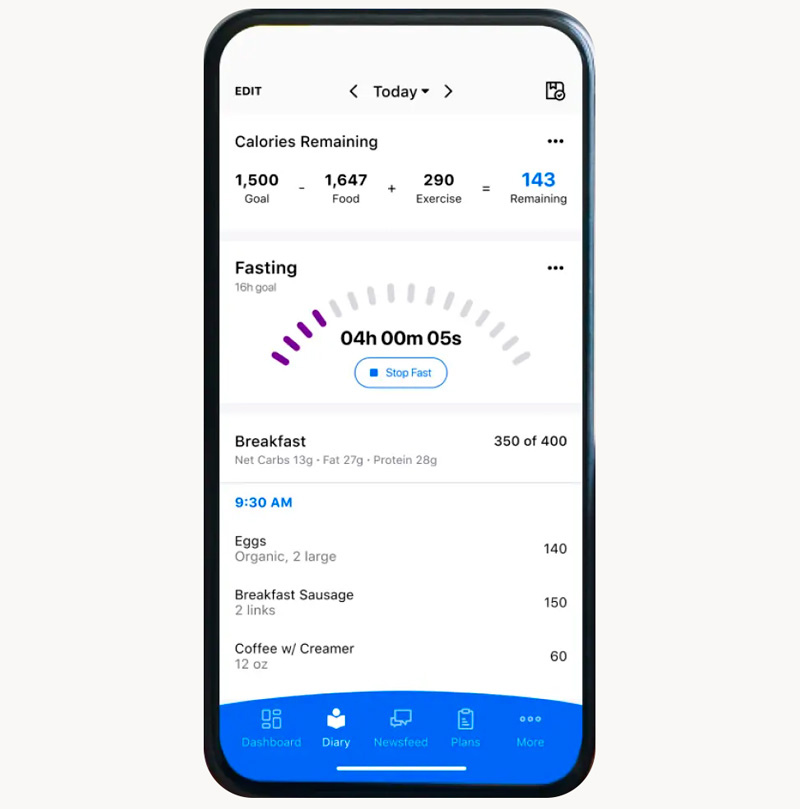
For more specific goals you may need to use an app created for that purpose. For diet and weight goals and tracking, I tracked my calories for over 900 days with MyFitnessPal. It makes it super easy to find and enter food, and as you can tell by how long I’ve been doing it, is not a chore to do.
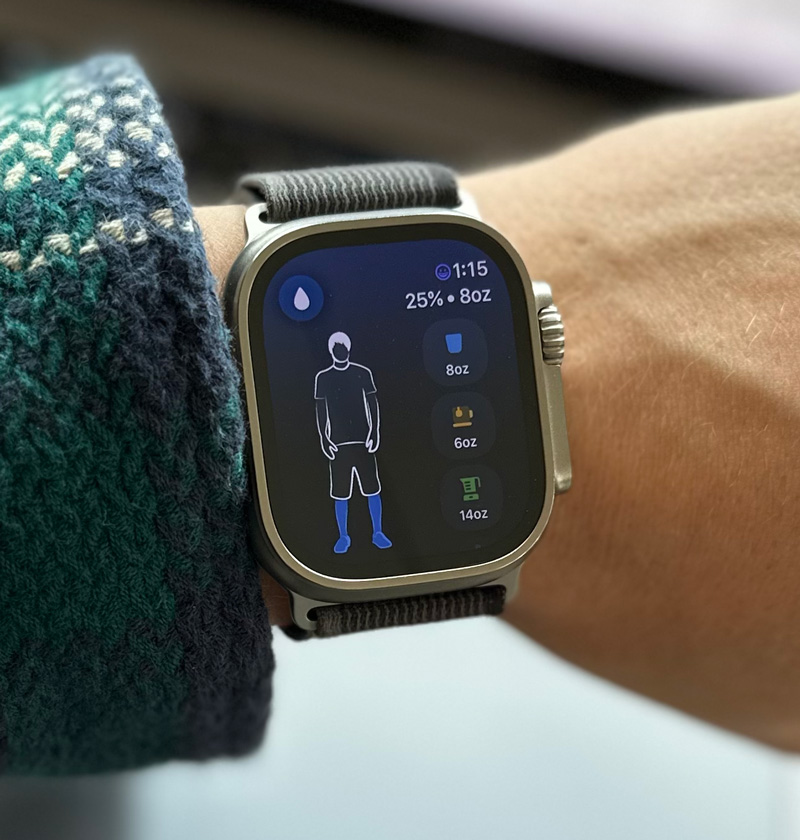
For tracking and improving my water intake, I use an app called Waterminder that makes it fast to log a glass of water, from your phone or smartwatch. It can also send you reminders so you don't have to rely on memory or feeling thirsty alone to stay hydrated.
For tracking gym goals I use the Strong app. It has a clean and fast UI and a lot of practical features like a set timer and it will remind you what weight you did last time so can determine if it’s time to increase resistance.
For tracking productivity goals, I've found several apps to be very helpful. Timelines is a mobile and Apple Watch app that allows you to very quickly start time tracking pre-determined things and can provide reports to measure milestones and progress. I've used it to keep track of everything from meditation, exercise, how long my morning routine takes me, to making sure I'm spending quality, intentional time with my pup. The nice thing about Timelines is you can use it to track and limit the time you're spending on something; or use it to track time milestones such as spending 2 hours per week exercising.
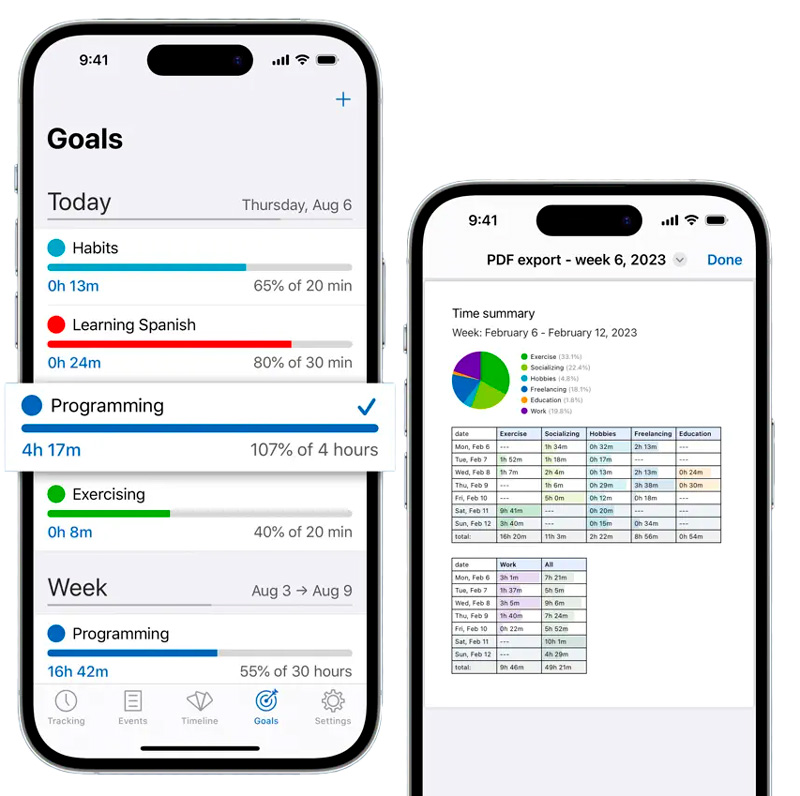
→ Now read this: Why People Don't Have What They Want: 12 Common Traps to Help Diagnose Stagnation
Buddy System for Accountability & Feedback
Being accountable to someone else for your goals can be extremely motivating. If you know someone who is willing to pair up with you to support each other’s goals, definitely take advantage of that.
What this looks like in practice can vary depending on your relationship and your individual goals. It could simply be texting each other each time you go to the gym. Or you could do a 20 minute weekly Facetime meeting where you identify challenges you’re facing in accomplishing your goals and help each other. If you and another creative friend have writing goals, you could set up a dedicated Slack channel that you both post your pages to as a way of tracking progress.
There are also thousands of online communities built for exactly this kind of thing. If you’re willing to put yourself out there, I highly recommend recruiting someone to be accountable to.
Embracing Setbacks Helps Motivation
Let’s talk about what happens when you don’t meet your goal.
First of all, goals are targets, and you don’t have to have 100% success with them.
I would argue that setbacks are at least as important as gains. Setbacks teach you how to fail quickly and efficiently. The more times you fall off and get back on, the greater your chances of turning your short-term goal into a long-term achievement.
How many times have you gotten into a good exercise routine only to stop completely for several months because the routine got tripped up with a vacation, holidays, or stressful work week?
In fact, the moment you realize you’re off course is proof your goals are working. If you’re able to quickly realize that you haven’t been doing your goal, it means it’s a measurable goal and you can make the necessary adjustments to get back on track right then and there.
This could be as simple as: Take a deep breath once you realize you’ve fallen off. Feel good about being self-aware enough to realize it. Let it go. Then–
Immediately take a step toward meeting your goal, like setting an extra alarm to wake up for your morning work out, or calling your goal-buddy to let them know what happened. Or didn’t happen.
Short-term goals are the building blocks of long-term goals because they create the critical momentum you need to get started and keep moving:
The creation of momentum is what proves to yourself that you are capable of establishing a goal and working toward it.
And once you've proven to yourself that you can accomplish goals, you realize you can accomplish anything with the right strategy.
Get moving toward the things you want. It’s just one week at a time.
What helps motivate you to make good goals? Let us know in the comments!



